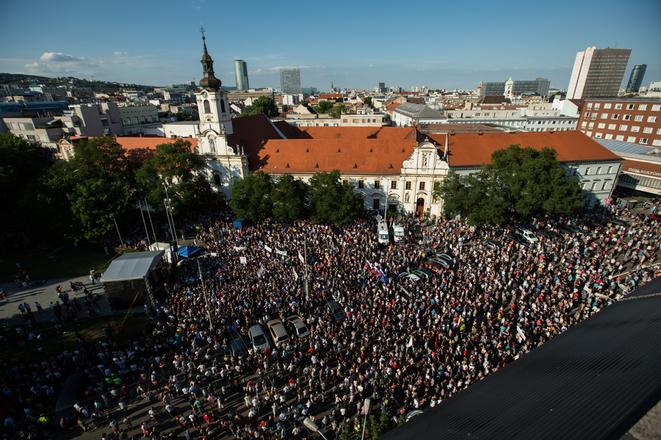After a series of tumultuous, and occasionally disastrous, political turns in recent years, there are signs that young people becoming more political assertive. In Slovakia, anti-corruption protests organized by high school students are drawing thousands of people to the streets and in this week’s UK election an estimated 72 percent of people aged 18-24 what voted in the election (1 million of them registered to vote in the month of May alone).
At first glance this a promising sign, and one is tempted to compare this youthful political energy to that of an earlier era, in the 1960s, when young people drove major political change in countries across the globe – the Civil Rights movement in the United States, a reckoning with the Nazi past in Germany, transition towards democracy in Japan, even Czechoslovakia’s Prague Spring. But there is one big problem, this time there are not enough young people.
As the historian Tony Judt has documented, between 1950 and 1970, the population in the UK grew by 13 percent, in Italy by 17 percent, in West Germany by 28 percent, in Sweden by 29 percent and in The Netherlands by 35 percent. For sake of comparison, the Dutch population grew 0.4 percent in 2015. By the mid-1960s the postwar baby boom generation was coming of age and asserting new political demands. It’s no wonder French students were able to bring their country to a standstill in 1968. By 1967, one-third of the population was under 20 years old. Today it is just 24 percent, as compared to 38 percent who are over 50 (9 percent are 75 or older).
This means that in the West today it is the old – not the energetic young – that dictate politics. For older voters, existential issues like climate change are much less alarming, because they won’t be around to suffer the worst consequences. Public funds are spent propping up unsustainable pension systems instead of investing in education – not because it is smart but because it is politically convenient.
In the UK, young people voted to stay in the European Union (and lost). This week they voted for the Labour party, which made gains on the Tories (but lost). In the United States, young people disproportionately voted for Hillary Clinton last year (and lost). In Slovakia, protests target corruption, but the party most responsible for that corruption – Smer – remains the most popular in the country.
The truth is that today’s young people can make a lot of noise, but on their own they just don’t have big enough numbers to drive changes. This perhaps explains why some of them are losing trust in democracy and opting to support extreme alternatives. In the 1960s, student movements changed politics forever, but for something similar to happen now the grandmothers of the world must take to the streets.



 June 5 anti-corruption march (source: SME)
June 5 anti-corruption march (source: SME)